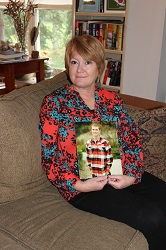About
 Overdose Prevention Therapy-Indiana (OptIN) is a registry of locations stocked with naloxone statewide. OptIN was established by Senate Bill 406, which passed the Indiana General Assembly in April 2015. The legislation is also known as Aaron's Law and is named for Aaron Sims of Indianapolis, who died due to a heroin overdose at the age of 20 in 2013. Since his death, Aaron's mother, Justin Phillips, has advocated for those struggling with substance use disorders and their families in hopes of removing the stigma associated with addiction.
Overdose Prevention Therapy-Indiana (OptIN) is a registry of locations stocked with naloxone statewide. OptIN was established by Senate Bill 406, which passed the Indiana General Assembly in April 2015. The legislation is also known as Aaron's Law and is named for Aaron Sims of Indianapolis, who died due to a heroin overdose at the age of 20 in 2013. Since his death, Aaron's mother, Justin Phillips, has advocated for those struggling with substance use disorders and their families in hopes of removing the stigma associated with addiction.
Aaron's Law allows lay people to carry and administer naloxone, a lifesaving overdose reversal drug, to an individual who is experiencing an opioid overdose. Lay people can obtain naloxone without a prescription from entities registered with OptIN, such as their local pharmacy or nonprofit agency, via the OptIN website.
 Entities such as treatment centers, overdose prevention organizations, community corrections facilities, pharmacies and local health departments that want to dispense naloxone under the Statewide Naloxone Standing Order must register with OptIN before dispensing naloxone. Entities also must train lay people in naloxone administration, instruct them to call 911 immediately before or after administering naloxone, and provide lay people with a list of resources for treatment prior to dispensing doses.
Entities such as treatment centers, overdose prevention organizations, community corrections facilities, pharmacies and local health departments that want to dispense naloxone under the Statewide Naloxone Standing Order must register with OptIN before dispensing naloxone. Entities also must train lay people in naloxone administration, instruct them to call 911 immediately before or after administering naloxone, and provide lay people with a list of resources for treatment prior to dispensing doses.